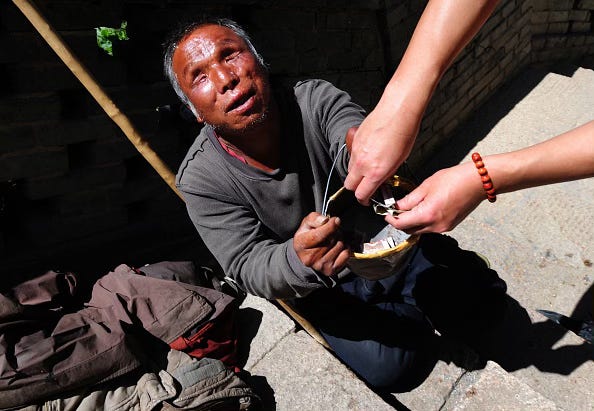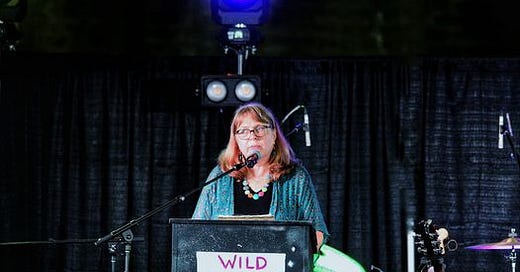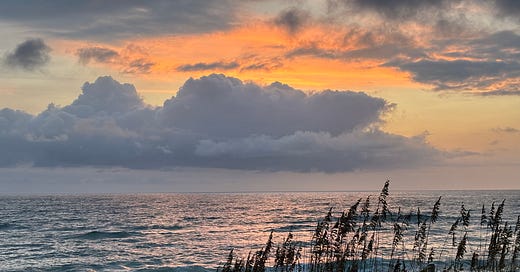

Discover more from The Cottage
Today is the Twenty-Third Sunday after Pentecost. The long season of Ordinary Time is moving toward its end in a little more than a month.
Advent begins on December 1 — and it is my favorite season of the Christian year. This year’s lectionary focuses on the Gospel of Luke and sounds themes of joy and justice.
That will be this year’s Advent Journey at the Cottage — Joy and Justice.
Stay tuned for more details soon. You can expect special reflections and seasonal posts to renew your spirit as the days grow shorter and we anticipate the coming of light in the darkness. 🕯️
Advent is always beautiful at The Cottage.
If you are able, please consider supporting The Cottage with a paid subscription. This completely independent newsletter depends 100% on the goodwill of its readers.
There are no advertisements (I hate those pop-ups!), no corporate sponsors, no grants, no institutional backers, and no list-selling. The only emails you receive are from me and occasionally a message from Substack, the platform that hosts The Cottage.
Mark 10:46-52
Jesus and his disciples came to Jericho. As he and his disciples and a large crowd were leaving Jericho, Bartimaeus son of Timaeus, a blind beggar, was sitting by the roadside.
When he heard that it was Jesus of Nazareth, he began to shout out and say, “Jesus, Son of David, have mercy on me!”
Many sternly ordered him to be quiet, but he cried out even more loudly, “Son of David, have mercy on me!”
Jesus stood still and said, “Call him here.” And they called the blind man, saying to him, “Take heart; get up, he is calling you.” So throwing off his cloak, he sprang up and came to Jesus.
Then Jesus said to him, “What do you want me to do for you?” The blind man said to him, “My teacher, let me see again.”
Jesus said to him, “Go; your faith has made you well.” Immediately he regained his sight and followed him on the way.
Today’s passage is from Mark 10, a chapter that includes five stories of people coming to Jesus to have their questions answered, to request a favor, or to be healed.
In each case, Jesus responded differently. And, in each case, the most privileged of those who came were sent away while the poor, rejected, and marginalized were welcomed into his presence. The chapter forms Mark’s transition between Jesus’ ministry and his Passion. It is a powerful summary of Jesus’ love for those who suffer and his commitment to the justice of God.
In short, it is pregnant with preaching possibilities — on grand themes of compassion and the Kingdom of God. It is rich in academic importance — especially on the theology of Jesus as Messiah.
And yet….
I find my imagination drifting to a more intimate spiritual space. I’m reflecting on Bartimaeus, that blind beggar, sitting by the roadside crying out for mercy, “My teacher, let me see again.”
A blind beggar. Think about that. Bartimaeus lived in complete uncertainty. All the time. He didn’t know who would feed him, care for him, or assist him. He didn’t know if someone would hurt him or help him. He didn’t know if he would eat or if he would die on a given day. His existence was absolutely contingent on the choices of others. He was at the mercy of those he couldn’t even see — all the time and in every way. He had little to look forward to and probably couldn’t even imagine a future.
Bartimaeus didn’t see Jesus. He couldn’t see him coming. He only heard Jesus was approaching, that Jesus was down the road. All he could do is cry out, shout. Mercy, please. Mercy. Help.
Have mercy on me. And what does he ask for? Let me see again.
Physical blindness terrifies me. It is, I suspect, a kind of archetypal human fear. I’ve had strong glasses since I was ten years old. I can’t see without them. Like others, I’ve discovered that as one ages, vision doesn’t get better! Our capacity to see changes over time and sometimes challenges us in frightening ways.
And yet, for all my worries about my own vision, I’ve learned a lot from friends who are blind — usually about the things that sighted people don’t see.
It is possible to have one’s physical sight and still lack the ability to see.
In the last two months, I’ve been on the road most weekends talking about what’s happening in the world right now — faith and democracy, authoritarianism and fascism, and the gospel versus Christian nationalism. At every event, someone has asked: What do you think will happen in November? What do you see that lies ahead?
I’ve had the same answer: I don’t know. I can’t see into the future.
Truthfully, I feel blind. I have no idea what is coming. I’m living in complete uncertainty.
It doesn’t feel good. I’m exhausted by uncertainty. I’m working hard fighting against what I fear is coming down the road. And yes, uncertainty makes me fearful. I’m anxious for the future of a church that I’m not sure has the resources to face this future; I’m fearful for the future of a nation that seems willing to risk the possibility of a truly inclusive and pluralistic democracy.
Events seem to be spinning beyond control, and not only political events. Hurricanes in the mountains, bombs in the Middle East, images of people who don’t exist flooding social media with lies about things that never happened, courts corrupted, compassion at a premium, families divided — the cacophony of a nation in crisis, a din of despair.
I’m sitting here. By the side of the road. Unsure about what is coming or where we are going.
What do I see? I can’t see anything right now.
What how do I pray? Jesus, have mercy on me!
I find myself in this story. Not as a disciple. Not as part of the crowd. Not as the one with any answers. But as a blind beggar. I can’t see. Have mercy on me!
That, of course, takes me back to Bartimaeus, the blind man, the one living in complete uncertainty, who, in effect, saw Jesus before he could see him.
Bartimaeus may have been blind, but he possessed spiritual insight. Sure, he probably cried out to anyone and everyone to help him. But he wasn’t asking randomly for help — he was asking the Son of David for mercy. Son of David was a messianic title for the Deliverer, not just any helper but the long-awaited Helper of Israel. Mercy, yes. But more. Redemption. Healing. Liberation. He trusted that his cry of uncertainty was directed toward the ultimate source of salvation.
And when Jesus called to him in return, the blind man threw off his cloak with assurance and “sprang up and came to him.” That uncertain beggar. The blind man who was completely dependent on others cast away his cloak and leaped toward Jesus. Uncertainty gave way to confidence, surety of safety, of help.
Notice: Bartimaeus only asked for mercy; he didn’t begged to be healed. Instead, Jesus turned to him and said, “What do you want me to do for you?”
Think of that — What do you want me to do for you?
That’s a thunderous question. The Son of David, the hoped-for Liberator, calls you and asks you: What do you want me to do for you?
How would you respond? What would you ask Jesus to do for you? Right now, in the midst of all this uncertainly, with its exhaustion and fear.
This isn’t a magic genie story, about Aladdin finding a lamp. It isn’t about a slot machine God. This is a story about how, even in the fog, when blinded, when living in total uncertainty, God comes along. And, if we listen, if we stay attuned and pay attention, we may hear our approaching liberation before we see anything — but salvation is on the way.
Perhaps uncertainty is the prerequisite to Jesus’ query. Maybe not seeing is necessary to fully see truthfully, clearly, and understanding.
Take heart; get up; the Deliverer is calling. And he asks, What do you want me to do for you?
Jesus have mercy, let us see again!
Comments are always open to paid subscribers. Free subscribers and visitors may comment on some posts for a short period following publication.
INSPIRATION
The poet reads his lines to the blind.
He hadn’t guessed that it would be so hard.
His voice trembles.
His hands shake.
He senses that every sentence
is put to the test of darkness.
He must muddle through alone,
without colors or lights.
A treacherous endeavor
for his poems’ stars,
dawns, rainbows, clouds, their neon lights, their moon,
for the fish so silvery thus far beneath the water
and the hawk so high and quiet in the sky.
He reads—since it’s too late to stop now—
about the boy in a yellow jacket on a green field,
red roofs that can be counted in the valley,
the restless numbers on soccer players’ shirts,
and the naked stranger standing in a half-shut door.
He’d like to skip—although it can’t be done—
all the saints on that cathedral ceiling,
the parting wave from a train,
the microscope lens, the ring casting a glow,
the movie screens, the mirrors, the photo albums.
But great is the courtesy of the blind,
great is their forbearance, their largesse.
They listen, smile, and applaud.
One of them even comes up
with a book turned wrongside out
asking for an unseen autograph.
—Wisława Szymborska, “The Courtesy of the Blind”
A Special Invitation from a Friend of The Cottage
A National Streaming Event of True Believer
A few weeks ago, The Cottage hosted a special screening of the new documentary, True Believer, for paid subscribers. The film was well-received and generated great conversations among subscribers.
Kristen Irving, the filmmaker, will be hosting a NATIONAL screening of the film, open to everyone and anyone interested in seeing the movie on TUESDAY, OCTOBER 29 at 8PM Eastern/5PM Pacific. The film is approximately 90 minutes.
This LIVE streaming event includes viewing the documentary and a panel discussion following (I’m one of the panelists!). Tickets are $15 and all proceeds will go to sharing the film more widely and to on-the-ground religious organizations involved in reproductive justice.
After the live event, ticket purchasers will receive a link to access the film until November 5th. So, if you can’t make it, you will be able to view later.
For information and registration, CLICK HERE. And make sure to share with your friends!
The Cottage is not hosting and does not receive any financial benefit from this event. Also, I don’t know the technical specifics for this online gathering. Details, tickets, and confirmation will come from Kinema, the film sharing platform.
I’m a friend of the film and would like to see it reach a wide audience.
Subscribe to The Cottage
Part retreat, part think tank. A place for inspiration and ideas about culture, faith, and spirit.
















This is my salvation story. I was an alcoholic for 11 years, and had no hope. Then I read of the blind beggar for the first time, and an ember of hope became a flame. That was 41 years ago.
Thank you for posting the link to the Tempe sermon. Fear and chaos is what a fascist tries to create. I have found three things work for me. One is working for a pro democracy organization. The other is saying the Offices and holding the Zoom link for Morning Prayer using CDP. There are people from Florida to Vancouver Island. The third involves information overload. I don’t watch TV. I curate which podcasts & social media I interact with. I have voted early. These three don’t remove the anxiety, but they do mitigate it. Your Substack is a blessing. Our church’s new Associate Rector told me you were her favorite professor.